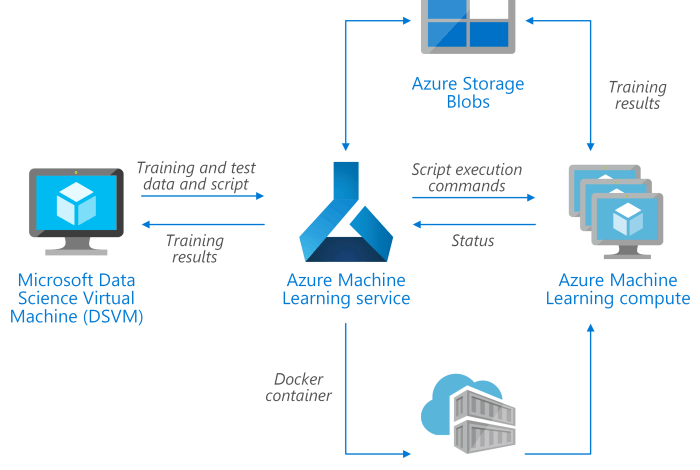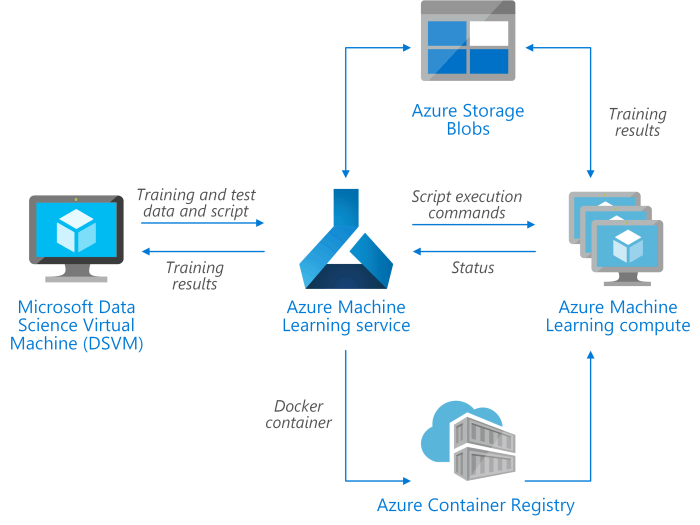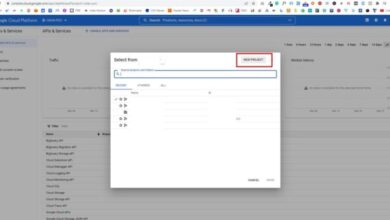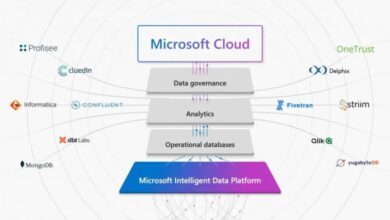
Learn Microsoft Azure Online Training: Your Path to Cloud Expertise
Learn Microsoft Azure online training opens the door to a world of cloud computing possibilities. Whether you’re a seasoned developer, a curious individual, or a business looking to leverage the power of the cloud, Azure offers a robust platform with endless potential.
It’s not just about technology; it’s about unlocking new opportunities, optimizing processes, and shaping the future of your endeavors.
Azure, Microsoft’s cloud computing platform, is a game-changer in today’s digital landscape. It provides a comprehensive suite of services that cater to various needs, from infrastructure management and data storage to application development and artificial intelligence. With its global reach, scalability, and security, Azure empowers individuals and businesses to achieve their goals and stay ahead of the curve.
Introduction to Microsoft Azure
The world of technology is rapidly evolving, and cloud computing has become an integral part of this transformation. Microsoft Azure is a powerful cloud computing platform that offers a wide range of services and solutions for businesses and individuals alike.
This comprehensive training program will guide you through the fundamentals of Azure, empowering you to leverage its capabilities and unlock new possibilities.
Cloud Computing: The Foundation of Azure
Cloud computing refers to the delivery of computing services – including servers, storage, databases, networking, software, analytics, and intelligence – over the internet (“the cloud”). It allows users to access and utilize these resources on demand, without the need for physical infrastructure.There are three main types of cloud computing services:
- Infrastructure as a Service (IaaS):IaaS providers offer access to fundamental computing resources, such as virtual machines (VMs), storage, and networking. Users have complete control over the operating system and applications running on these resources.
- Platform as a Service (PaaS):PaaS providers offer a platform for developing and deploying applications, handling infrastructure management and providing tools for development, deployment, and scaling.
- Software as a Service (SaaS):SaaS providers offer fully functional applications accessible through the internet. Users can access and use these applications without needing to install or manage any software on their devices.
Azure fits into the cloud computing landscape by offering a comprehensive suite of IaaS, PaaS, and SaaS services. This allows businesses and individuals to choose the services that best meet their specific needs and requirements.
Benefits of Using Microsoft Azure
Microsoft Azure provides numerous benefits for businesses and individuals, including:
- Cost-effectiveness:Azure’s pay-as-you-go pricing model allows users to only pay for the resources they use, reducing upfront investments and operational costs.
- Scalability and Flexibility:Azure’s scalable infrastructure enables businesses to easily adjust their resources based on demand, ensuring optimal performance and cost efficiency.
- Global Reach:Azure’s extensive global network of data centers provides low latency and high availability, ensuring seamless access to services worldwide.
- Security and Compliance:Azure prioritizes security and compliance, offering a wide range of security features and certifications to protect sensitive data and meet regulatory requirements.
- Innovation and Development:Azure offers a rich ecosystem of tools and services for developers, enabling them to build and deploy innovative applications and solutions.
Real-World Applications and Use Cases for Azure
Azure is used across a wide range of industries and applications, including:
- Web and Mobile Application Hosting:Azure provides reliable and scalable infrastructure for hosting websites, web applications, and mobile apps.
- Data Storage and Analytics:Azure offers various storage solutions, including blob storage, file storage, and database services, enabling businesses to store, manage, and analyze vast amounts of data.
- Artificial Intelligence (AI) and Machine Learning (ML):Azure provides powerful AI and ML services, allowing businesses to automate tasks, gain insights from data, and improve decision-making.
- Internet of Things (IoT):Azure supports IoT applications, enabling businesses to connect and manage devices, collect data, and create intelligent solutions.
- DevOps and Continuous Integration/Continuous Delivery (CI/CD):Azure provides tools and services for automating software development, testing, and deployment, improving efficiency and reducing time to market.
Azure’s versatility and comprehensive feature set make it a valuable platform for businesses and individuals seeking to leverage the power of cloud computing.
Azure Services and Features: Learn Microsoft Azure Online Training
Azure provides a comprehensive suite of cloud computing services, encompassing everything from compute and storage to networking and databases. This allows businesses to build, deploy, and manage applications in a flexible and scalable manner.
Azure Services Categorization
The vast array of Azure services can be categorized based on their primary purpose. This categorization helps in understanding the different aspects of Azure and how they work together.
| Category | Service | Description | Key Features | Common Use Cases |
|---|---|---|---|---|
| Compute | Virtual Machines (VMs) | Virtual machines offer a traditional infrastructure experience, providing complete control over the operating system and applications. |
|
|
| Compute | Azure Functions | Serverless computing platform that allows you to run code without managing servers. |
|
|
| Storage | Blob Storage | Stores unstructured data like images, videos, and documents. |
|
|
| Storage | Azure Files | Provides fully managed file shares accessible through SMB protocol. |
|
|
| Networking | Virtual Network (VNet) | Provides a private network for your Azure resources, allowing secure communication between them. |
|
|
| Networking | Azure Load Balancer | Distributes incoming traffic across multiple instances of an application, ensuring high availability and scalability. |
|
|
| Databases | Azure SQL Database | Fully managed relational database service based on SQL Server. |
|
|
| Databases | Cosmos DB | Globally distributed, multi-model database service for high-performance, scalable applications. |
|
|
Comparing Azure Virtual Machine Types
Azure offers various virtual machine types, each tailored for specific workloads and performance requirements.
Learning Microsoft Azure online can be a great way to boost your career in cloud computing, but it’s important to find the right training program for your needs. Just like choosing the perfect teether and pacifier clip for your little one, finding the right Azure training can make a big difference in your learning experience.
For a DIY approach to making a teether and pacifier clip, check out this tutorial: teether and pacifier clip diy. Once you’ve got the basics down, consider exploring Azure’s extensive online training resources, including interactive courses and hands-on labs.
| VM Type | CPU Cores | Memory (GB) | Storage (GB) | Use Cases |
|---|---|---|---|---|
| Basic | 1-2 | 1-4 | 127 | Development and testing, small-scale applications |
| Standard | 1-16 | 2-128 | 1023 | General-purpose workloads, web servers, databases |
| Premium | 1-64 | 4-416 | 1023 | High-performance computing, demanding applications |
| Memory Optimized | 1-40 | 8-896 | 1023 | In-memory databases, caching, data analytics |
| Storage Optimized | 1-32 | 8-224 | 4095 | Large-scale data storage, data warehousing |
Learning Resources and Paths

Embarking on your Azure journey requires a structured approach, and fortunately, Microsoft offers a plethora of resources to guide you every step of the way. Whether you’re a beginner or an experienced cloud professional, there’s a learning path tailored to your needs.This section delves into the comprehensive world of Microsoft Azure learning resources, exploring official documentation, interactive tutorials, and structured courses.
We’ll also examine popular online platforms that offer Azure training, providing you with a roadmap to navigate the Azure landscape effectively.
Learning Microsoft Azure online can be a great way to boost your career, but it can also be a little overwhelming. If you’re looking for a break from the cloud, consider a simple DIY project to unwind. Why not try making a cozy scarf as a gift for a friend or family member?
You can find a great tutorial on how to make a simple DIY scarf that will help you relax and create something beautiful. Once you’ve finished, you can jump back into your Azure training with a fresh perspective!
Official Microsoft Azure Learning Resources
Microsoft provides a wealth of resources to empower you in your Azure learning journey. From comprehensive documentation to interactive tutorials, these resources cater to various learning styles and skill levels.
Learning Microsoft Azure online can be a great way to boost your career, especially with the growing demand for cloud computing professionals. While you’re focusing on your professional development, you might want to take a break and treat yourself to some retail therapy.
The Kildare Village private sale ends this weekend , offering fantastic deals on designer brands. After you’ve shopped till you drop, you can get back to your Azure training with renewed energy and a fresh perspective.
- Microsoft Learn:Microsoft Learn is a free online learning platform offering interactive courses, hands-on labs, and certification preparation. It’s a valuable starting point for beginners and a great way to explore specific Azure services.
- Azure Documentation:The official Azure documentation is an extensive resource covering all aspects of Azure, including services, features, pricing, and best practices. It’s a comprehensive reference guide for both beginners and advanced users.
- Azure Tutorials:Microsoft offers a collection of step-by-step tutorials that guide you through common Azure tasks, from setting up virtual machines to deploying web applications. These tutorials provide practical examples and hands-on experience.
- Azure Quickstarts:Quickstarts are short, focused tutorials that demonstrate how to perform specific tasks in Azure. They are ideal for quickly learning how to use a particular service or feature.
Popular Online Platforms for Azure Training
Beyond Microsoft’s official resources, several online platforms offer Azure training courses, providing flexibility and convenience. These platforms cater to diverse learning preferences and offer a wide range of courses to suit different skill levels.
- Coursera:Coursera partners with leading universities and institutions to offer specialized Azure courses. These courses often provide in-depth knowledge and are ideal for professionals seeking advanced skills.
- Udemy:Udemy hosts a vast library of Azure courses, ranging from beginner-friendly introductions to advanced topics. It offers a flexible learning environment with a variety of instructors and course formats.
- edX:edX collaborates with renowned universities to deliver high-quality Azure courses. These courses often cover specific Azure technologies and are suitable for individuals seeking a structured learning experience.
Structured Learning Paths
A structured learning path can streamline your Azure learning journey by providing a clear roadmap and ensuring you acquire the necessary knowledge and skills in a logical order. Here’s a recommended learning path for different skill levels:
Beginner
- Fundamentals of Cloud Computing:Start by understanding the basics of cloud computing, including concepts like IaaS, PaaS, and SaaS. Microsoft Learn offers a free course on this topic.
- Introduction to Azure:Explore the core services and features of Azure, including virtual machines, storage, networking, and security. Microsoft Learn’s “Introduction to Azure” module is an excellent starting point.
- Hands-on Azure Labs:Gain practical experience by completing hands-on labs. Microsoft Learn offers a variety of labs covering various Azure services.
Intermediate
- Azure Solutions Architect:Deepen your understanding of Azure architecture and design principles. Microsoft Learn offers courses and certifications related to Azure Solutions Architect.
- Azure DevOps:Learn how to use Azure DevOps for continuous integration and continuous delivery (CI/CD). Microsoft Learn provides comprehensive courses and tutorials on Azure DevOps.
- Azure Security:Explore security best practices and tools within the Azure ecosystem. Microsoft Learn offers courses and certifications focused on Azure security.
Advanced
- Azure Advanced Services:Dive into advanced Azure services, such as Azure Kubernetes Service (AKS), Azure Cognitive Services, and Azure IoT. Microsoft Learn and other online platforms offer specialized courses on these topics.
- Azure Certifications:Validate your expertise by pursuing Azure certifications. Microsoft offers various certifications, including Azure Solutions Architect Expert and Azure DevOps Engineer Expert.
- Community Engagement:Engage with the Azure community through forums, blogs, and social media. This is an excellent way to learn from peers, share knowledge, and stay updated on the latest trends.
Hands-on Practice and Projects
Hands-on practice is essential for solidifying your understanding of Microsoft Azure and gaining practical experience. This section Artikels practical exercises and projects to enhance your learning journey.
Practical Exercises and Projects
Engaging in hands-on exercises and projects provides a practical understanding of Azure services and their applications. Here are some suggestions:
- Creating a Virtual Machine (VM):This exercise involves deploying a virtual machine in Azure, configuring its settings, and accessing it remotely. It allows you to explore basic Azure infrastructure management.
- Building a Web Application:This project involves creating a simple web application and deploying it to Azure App Service. You can use technologies like ASP.NET, Node.js, or Python to build the application.
- Implementing Azure Storage:This project focuses on utilizing Azure Storage services like Blob storage, Queue storage, and Table storage to store data and manage resources efficiently.
- Setting up a Database:This project involves creating a database in Azure SQL Database and configuring its settings. You can then connect to the database from your application.
- Exploring Azure Cognitive Services:This project involves experimenting with Azure Cognitive Services, such as Computer Vision, Text Analytics, and Speech to Text. You can build applications that leverage these services for image analysis, sentiment analysis, and speech recognition.
Creating a Personal Azure Account and Exploring Free Tier Services, Learn microsoft azure online training
Azure offers a free tier that allows you to explore its services without incurring significant costs. To get started, you can create a free Azure account and access the free tier services.
- Sign Up for a Free Account:Visit the Azure website and sign up for a free account. You’ll be prompted to enter your details and choose a subscription type.
- Explore Free Tier Services:The free tier includes a set of services with limited usage. This includes Azure VMs, Azure Storage, Azure SQL Database, and Azure App Service.
- Utilize Free Trial Offers:Azure often provides free trial offers for specific services. These offers allow you to use premium services for a limited period without cost.
Participating in Azure Hackathons and Online Communities
Engaging with the Azure community through hackathons and online forums provides opportunities to learn from peers, share knowledge, and stay updated on the latest Azure technologies.
- Participate in Azure Hackathons:Azure hackathons are events where developers can collaborate and build innovative solutions using Azure services. These events provide a platform to test your skills and gain practical experience.
- Join Azure Online Communities:Engage in online communities like Microsoft Q&A, Stack Overflow, and Azure forums to ask questions, share knowledge, and connect with other Azure professionals.
- Follow Azure Blogs and Social Media:Stay informed about the latest Azure updates and advancements by following official Azure blogs and social media channels.
Career Opportunities in Azure

The adoption of cloud computing continues to accelerate, making Microsoft Azure one of the most sought-after cloud platforms globally. This surge in demand translates into a wealth of career opportunities for individuals skilled in Azure technologies. The increasing reliance on cloud solutions across diverse industries has created a substantial need for professionals with Azure expertise.
Azure Certifications and Their Value
Azure certifications are highly valued in the job market, serving as a testament to an individual’s knowledge and proficiency in Azure technologies. These certifications not only demonstrate expertise but also provide a competitive edge when seeking employment or career advancement.
- Azure Fundamentals (AZ-900): This foundational certification validates basic knowledge of cloud concepts and Azure services, ideal for those starting their Azure journey.
- Azure Solutions Architect Expert (AZ-305): This certification targets professionals responsible for designing and implementing Azure solutions, showcasing advanced skills in architecture, design, and implementation.
- Azure DevOps Engineer Expert (AZ-400): This certification focuses on professionals who build and manage Azure DevOps pipelines, demonstrating expertise in CI/CD, source control, and deployment strategies.
Career Paths and Potential Roles
Azure expertise opens doors to a wide range of career paths, offering opportunities in various industries and roles. The demand for skilled Azure professionals extends across different sectors, from IT and software development to data science and cybersecurity.
- Cloud Architect: Designs and implements cloud solutions, leveraging Azure services to meet business requirements.
- Azure DevOps Engineer: Manages Azure DevOps pipelines, automating build, test, and deployment processes to enhance software delivery.
- Azure Data Engineer: Works with Azure data services to design, build, and maintain data pipelines and solutions, ensuring data integrity and accessibility.
- Azure Security Engineer: Focuses on securing Azure environments, implementing security policies, and managing threat detection and response.







